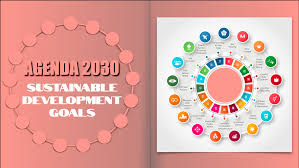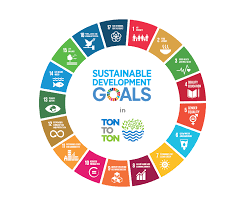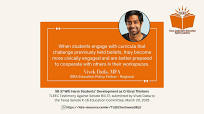The 2030 Agenda: A Blueprint for Sustainable Development
In September 2015, world leaders gathered at the United Nations Headquarters in New York to adopt the 2030 Agenda for Sustainable Development. This ambitious agenda consists of 17 Sustainable Development Goals (SDGs) aimed at addressing global challenges and creating a more sustainable future for all.
The Goals of the 2030 Agenda
Each of the 17 SDGs targets a specific area of development, from ending poverty and hunger to promoting gender equality and combating climate change. These goals are interconnected and aim to leave no one behind, ensuring that progress is made in a holistic and inclusive manner.
Some key goals include:
- No Poverty: End poverty in all its forms everywhere.
- Zero Hunger: End hunger, achieve food security, improve nutrition, and promote sustainable agriculture.
- Quality Education: Ensure inclusive and equitable quality education and promote lifelong learning opportunities for all.
- Sustainable Cities and Communities: Make cities and human settlements inclusive, safe, resilient, and sustainable.
The Importance of the 2030 Agenda
The 2030 Agenda provides a comprehensive framework for countries to work towards a more sustainable future. By focusing on social, economic, and environmental dimensions of development, the agenda recognizes the interconnectedness of global challenges and the need for collective action.
Implementing the SDGs requires collaboration among governments, businesses, civil society organizations, and individuals. It calls for innovative solutions, increased investments in key sectors, and policy coherence at national and international levels.
Challenges Ahead
While progress has been made towards achieving the SDGs since their adoption in 2015, significant challenges remain. Inequality persists within and among countries, climate change poses a growing threat to our planet, and conflicts continue to disrupt peace and stability in many regions.
To overcome these challenges and accelerate progress towards the 2030 Agenda, renewed commitment is needed from all stakeholders. This includes increased funding for development projects, stronger political will to implement policies that support sustainable development, and greater awareness among communities about their role in achieving the SDGs.
In Conclusion
The 2030 Agenda represents a shared vision for a better world—a world where prosperity is inclusive, societies are resilient, and our planet is protected. As we work towards achieving the Sustainable Development Goals by 2030, let us remember that our actions today will shape the future for generations to come. Together, we can build a more sustainable world for all.
6 Essential Tips for Engaging with the 2030 Agenda and Achieving the SDGs
- Familiarize yourself with the 17 Sustainable Development Goals (SDGs) outlined in the 2030 Agenda.
- Understand the interconnectedness of social, economic, and environmental issues addressed by the SDGs.
- Take action at a local level to contribute to achieving the global targets set by the 2030 Agenda.
- Advocate for policies that align with the principles of sustainability and inclusivity outlined in the SDGs.
- Educate others about the importance of sustainable development and encourage collective efforts towards its realization.
- Monitor progress towards the SDG targets and hold governments and organizations accountable for their commitments.
Familiarize yourself with the 17 Sustainable Development Goals (SDGs) outlined in the 2030 Agenda.
To effectively contribute to the global efforts towards sustainable development, it is crucial to familiarize yourself with the 17 Sustainable Development Goals (SDGs) outlined in the 2030 Agenda. Each goal addresses a specific aspect of development, from eradicating poverty and hunger to promoting clean energy and climate action. By understanding these goals and their interconnections, individuals and organizations can align their actions and initiatives to make meaningful contributions towards a more sustainable and equitable future for all.
Understand the interconnectedness of social, economic, and environmental issues addressed by the SDGs.
Understanding the interconnectedness of social, economic, and environmental issues addressed by the Sustainable Development Goals (SDGs) is crucial for effective implementation of the 2030 Agenda. By recognizing how these different aspects of development are intertwined, we can develop holistic solutions that address root causes and promote sustainable progress. Social inequalities can impact economic opportunities, which in turn affect environmental sustainability. By taking a comprehensive approach that considers the interplay between these areas, we can create more impactful strategies that lead to positive outcomes for people and the planet.
Take action at a local level to contribute to achieving the global targets set by the 2030 Agenda.
Taking action at a local level is a crucial step in contributing to the achievement of the global targets set by the 2030 Agenda. By engaging with your community, advocating for sustainable practices, and supporting initiatives that align with the Sustainable Development Goals, you can make a tangible impact on a broader scale. Whether it’s promoting education, environmental conservation, or social equality within your neighborhood or city, every effort counts towards building a more sustainable and inclusive future for all. Remember, change starts from within our communities, and together, we can work towards realizing the vision of the 2030 Agenda.
Advocate for policies that align with the principles of sustainability and inclusivity outlined in the SDGs.
It is crucial to advocate for policies that align with the principles of sustainability and inclusivity outlined in the Sustainable Development Goals (SDGs) of the 2030 Agenda. By promoting policies that prioritize environmental protection, social equity, and economic development, we can contribute to a more sustainable and inclusive future for all. Embracing these principles in policymaking not only helps address pressing global challenges but also ensures that progress is made in a way that benefits both current and future generations. Through advocacy and action, we can advance the goals of the 2030 Agenda and create a world where prosperity is shared, communities thrive, and our planet thrives.
Educate others about the importance of sustainable development and encourage collective efforts towards its realization.
It is crucial to educate others about the significance of sustainable development and to inspire collective efforts towards its achievement. By raising awareness about the goals outlined in the 2030 Agenda and emphasizing the interconnectedness of global challenges, we can empower individuals and communities to take action towards a more sustainable future. Through education and advocacy, we can foster a sense of responsibility and collaboration that is essential for making meaningful progress towards a world that is equitable, resilient, and environmentally conscious.
Monitor progress towards the SDG targets and hold governments and organizations accountable for their commitments.
Monitoring progress towards the Sustainable Development Goal (SDG) targets is crucial for ensuring accountability and transparency in achieving the 2030 Agenda. By tracking and evaluating the implementation of these targets, it becomes possible to identify areas that require attention and improvement. Holding governments and organizations accountable for their commitments to the SDGs helps maintain momentum and drive action towards sustainable development. It also fosters a culture of responsibility, encouraging stakeholders to fulfill their obligations and work collaboratively towards a more equitable and prosperous future for all.





